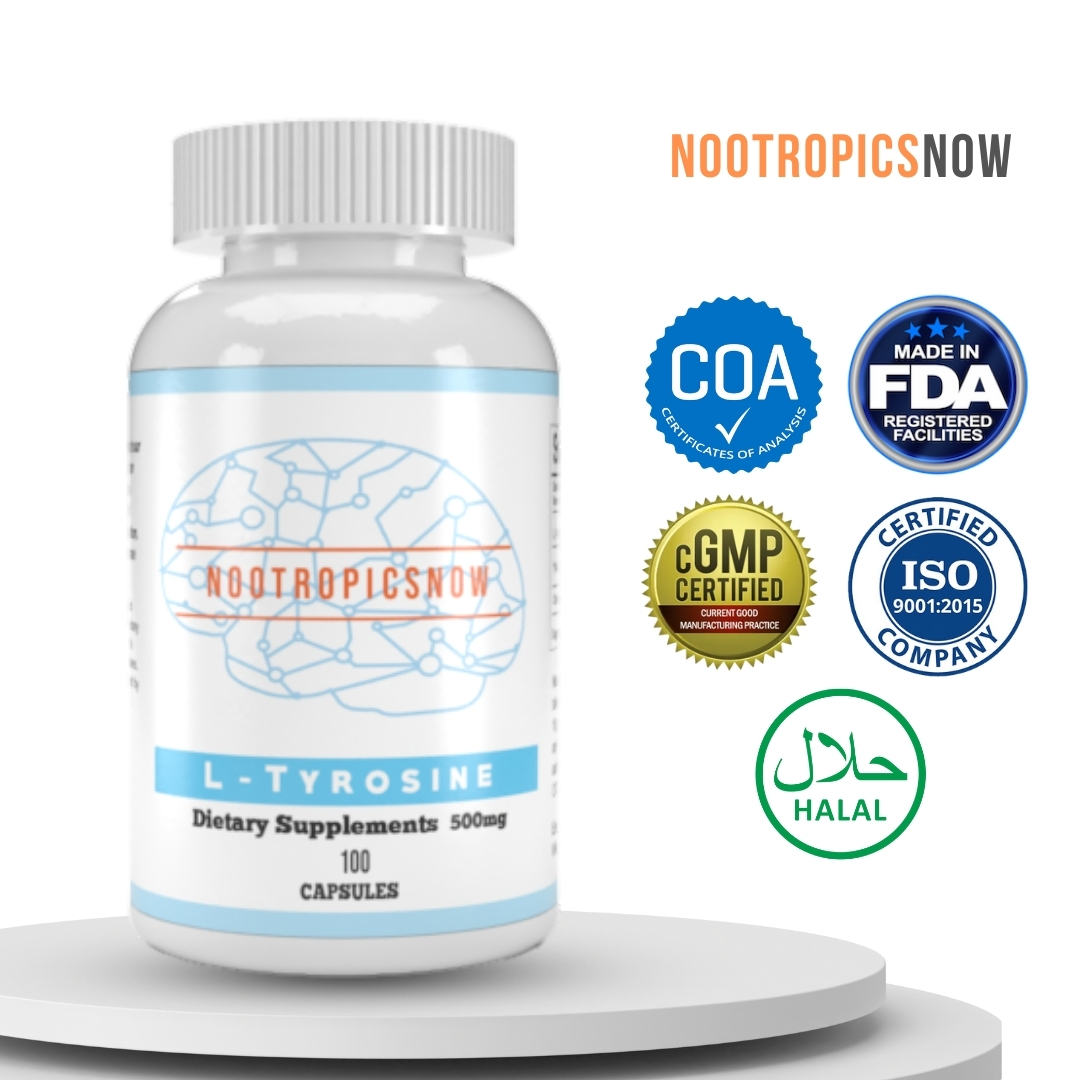L-Tyrosine Benefits: Dosage, Uses, & Side Effects

`markdown
L-Tyrosine: A Comprehensive Guide to Benefits, Uses, and Side Effects
L-Tyrosine is an amino acid crucial for numerous bodily functions. Understanding its role can help optimize health and well-being. This article will delve into L-Tyrosine’s mechanisms, benefits, potential side effects, and recommended dosages.
What is L-Tyrosine?

L-Tyrosine, also known simply as tyrosine, is a non-essential amino acid. “Non-essential” doesn’t mean unimportant; it means the human body can typically produce it from another amino acid, phenylalanine. However, dietary intake of L-tyrosine can be beneficial, particularly under stressful conditions or during periods of increased demand. L-Tyrosine serves as a building block for proteins and various vital substances in the body.
How Does L-Tyrosine Work?
L-Tyrosine’s primary function involves its role as a precursor for several key neurotransmitters. These neurotransmitters are critical for mood regulation, cognitive function, and the body’s response to stress. Therefore, ensuring adequate levels of L-tyrosine is vital for maintaining optimal mental and physical performance.
Key Neurotransmitters Synthesized from L-Tyrosine:
L-Tyrosine also plays a role in the production of melanin, the pigment responsible for skin and hair color. Additionally, it is involved in the synthesis of thyroid hormones, which regulate metabolism. Consequently, its impact spans numerous aspects of health.
Benefits of L-Tyrosine Supplementation
Supplementing with L-tyrosine can offer various benefits, particularly in specific situations. Research suggests that its advantages are most noticeable under stress or conditions requiring heightened cognitive performance. Nonetheless, the consistent usage of L-tyrosine may provide baseline improvements.
Stress Management:
One of L-tyrosine’s most notable benefits involves its ability to mitigate the effects of stress. During stressful periods, the body rapidly depletes neurotransmitters like norepinephrine. Supplementing with L-tyrosine can help replenish these neurotransmitters, thereby improving cognitive function and reducing the negative impact of stress on mental performance. Studies involving military personnel and individuals in demanding jobs have shown that L-tyrosine can enhance alertness, memory, and decision-making under stressful conditions.
Improved Cognitive Function:
L-Tyrosine can significantly improve cognitive function, particularly in situations requiring focused attention and mental clarity. By increasing dopamine and norepinephrine levels, L-tyrosine enhances focus, memory, and overall cognitive performance. Several studies have demonstrated that it can improve performance on cognitive tasks, such as memory recall and attention span, especially during stressful situations.
Enhanced Mood Regulation:
L-Tyrosine’s role in dopamine production makes it an important factor in mood regulation. Low dopamine levels are associated with symptoms of depression and decreased motivation. Supplementing with L-tyrosine can help increase dopamine levels, potentially alleviating symptoms of low mood and improving overall well-being. However, it is crucial to consult a healthcare professional before using L-tyrosine to treat depression, especially if you are already taking antidepressant medications.
Support for Thyroid Health:
L-Tyrosine is a necessary component in the production of thyroid hormones, which regulate metabolism. Adequate L-tyrosine levels are essential for maintaining healthy thyroid function. Individuals with hypothyroidism (underactive thyroid) may benefit from L-tyrosine supplementation, though it is essential to monitor thyroid hormone levels under medical supervision.
Potential Benefits for Exercise Performance:
Some research suggests that L-tyrosine may enhance exercise performance. A study published in the “Journal of the International Society of Sports Nutrition” found that L-tyrosine supplementation improved endurance performance and reduced perceived exertion in cyclists. The enhanced neurotransmitter function could improve focus and motivation during intense physical activity.
`

View Product
`
`

View Product
`
`

View Product
`
`
View Product-Brain-Boost-Amino-Acid-Mood-Stress-Cognitive-Supplement-i.202321183.9309302097)
`
Food Sources of L-Tyrosine
While the body can produce L-tyrosine from phenylalanine, obtaining it from dietary sources is also essential. Incorporating L-tyrosine-rich foods into your diet can help maintain adequate levels of this important amino acid.
Excellent food sources include:
Consuming a balanced diet that includes these foods can help ensure adequate L-tyrosine levels, supporting overall health and well-being.
L-Tyrosine Dosage: How Much Should You Take?
Determining the appropriate dosage of L-tyrosine depends on individual needs and goals. While there is no established Recommended Dietary Allowance (RDA) for L-tyrosine, general guidelines and research-backed dosages can help inform your supplementation strategy.
General Dosage Guidelines:
Timing of Supplementation:
Important Considerations:
Potential Side Effects and Interactions
L-Tyrosine is generally considered safe for most people when taken in appropriate dosages. However, like any supplement, it can cause side effects in some individuals. Being aware of these potential side effects and interactions is essential for safe usage.
Common Side Effects:
Potential Interactions:
Contraindications:
Forms of L-Tyrosine: L-Tyrosine vs. N-Acetyl L-Tyrosine (NALT)
L-Tyrosine is available in several forms, with the two most common being L-Tyrosine and N-Acetyl L-Tyrosine (NALT). Understanding the differences between these forms is important for choosing the right supplement.
L-Tyrosine:
N-Acetyl L-Tyrosine (NALT):
Which Form is Better?
For most individuals, L-Tyrosine is the preferred choice due to its proven effectiveness and lower cost. While NALT may offer some benefits in terms of stability, its questionable bioavailability makes it a less reliable option. If you choose to use NALT, be aware that you may need a higher dosage to achieve the same effects as L-Tyrosine.
Stacking L-Tyrosine with Other Supplements
Combining L-Tyrosine with other supplements can potentially enhance its effects and provide synergistic benefits. However, it’s essential to research and understand the potential interactions before stacking supplements.
Popular Stacks:
View Product-Nootropic-Brain-Support-Booster-Memory-Sleep-Supplement-i.202321183.5451568422)
View Product-Nootropic-Brain-Focus-Memory-Booster-Supplement-Neuropro-i.202321183.4051573042)
Precautions:
L-Tyrosine for Specific Conditions
While L-Tyrosine is not a treatment for specific medical conditions, it has been studied for its potential benefits in managing symptoms associated with certain conditions.
Depression:
L-Tyrosine is a precursor to dopamine, a neurotransmitter associated with mood regulation. Some studies suggest that L-Tyrosine may help alleviate symptoms of depression, particularly in individuals with low dopamine levels. However, it is crucial to consult a healthcare professional before using L-Tyrosine to treat depression, especially if you are already taking antidepressant medications.
ADHD (Attention-Deficit/Hyperactivity Disorder):
Some research suggests that L-Tyrosine may help improve attention and focus in individuals with ADHD. By increasing dopamine and norepinephrine levels, L-Tyrosine can potentially enhance cognitive function and reduce symptoms of hyperactivity and impulsivity. However, more research is needed to confirm these benefits, and L-Tyrosine should not be used as a replacement for conventional ADHD treatments.
Phenylketonuria (PKU):
Phenylketonuria (PKU) is a genetic disorder in which the body cannot properly metabolize phenylalanine, the amino acid from which L-Tyrosine is produced. Individuals with PKU often have low L-Tyrosine levels and may benefit from L-Tyrosine supplementation. However, supplementation should be carefully monitored by a healthcare professional.
Hypothyroidism:
L-Tyrosine is involved in the production of thyroid hormones, which regulate metabolism. Individuals with hypothyroidism (underactive thyroid) may benefit from L-Tyrosine supplementation to support thyroid function. However, it is essential to monitor thyroid hormone levels under medical supervision.
The Future of L-Tyrosine Research
Research on L-Tyrosine is ongoing, with new studies exploring its potential benefits for various aspects of health and cognitive function. Future research may focus on:
Conclusion
L-Tyrosine is a versatile amino acid with a wide range of potential benefits for cognitive function, stress management, and overall health. By serving as a precursor to key neurotransmitters and hormones, L-Tyrosine plays a vital role in maintaining optimal mental and physical performance.
While L-Tyrosine is generally considered safe, it is essential to use it responsibly and be aware of potential side effects and interactions. Before starting L-Tyrosine supplementation, consult a healthcare provider, especially if you have underlying health conditions or are taking medications.
By understanding the benefits, dosage guidelines, and safety considerations associated with L-Tyrosine, you can make informed decisions about whether this supplement is right for you. Whether you are looking to enhance cognitive function, manage stress, or support thyroid health, L-Tyrosine may offer a valuable tool for
L-Tyrosine: A Deep Dive into Benefits, Uses, and Considerations
L-Tyrosine, a nonessential amino acid, plays a crucial role in numerous bodily functions. Your body naturally synthesizes it from phenylalanine, another amino acid. However, understanding its functions, benefits, potential side effects, and optimal usage is essential. L-Tyrosine serves as a precursor to vital neurotransmitters and hormones, influencing mood, cognition, and overall well-being.
Understanding L-Tyrosine’s Role
L-Tyrosine, also known simply as tyrosine, is a building block of protein. More importantly, it’s a key player in the synthesis of several important substances in the body. These include:
Consequently, adequate levels of L-tyrosine are necessary for optimal mental and physical health.
L-Tyrosine Benefits: Unveiling the Science
The potential benefits of L-tyrosine have been explored in various studies. While results vary, several areas show promising results.
1. Cognitive Enhancement Under Stress
One of the most researched areas is L-tyrosine’s potential to improve cognitive function during stressful situations. Stress, whether physical or mental, can deplete neurotransmitter levels, impairing cognitive performance. Studies suggest that L-tyrosine supplementation can help replenish these neurotransmitters. For instance, research has shown that L-tyrosine can improve memory and reaction time during demanding tasks or periods of sleep deprivation. A 2015 study in the journal Military Medicine indicated that L-tyrosine could significantly improve cognitive performance in military cadets undergoing stressful training. Furthermore, a 2021 study published in Nutrients found that L-tyrosine improves attention and reduces blood pressure under multi-tasking induced stress. This suggests L-tyrosine may be beneficial for individuals in high-stress professions or those experiencing acute stress.
2. Mood Regulation
Given its role in dopamine production, L-tyrosine may influence mood. Some studies have investigated its potential in alleviating symptoms of depression, particularly when dopamine deficiency is suspected. However, the evidence is mixed, and more research is necessary. L-Tyrosine may be effective in situations where mood is compromised by external factors, such as stress or sleep deprivation. Furthermore, the amino acid is more potent with certain types of depression. Research suggests L-Tyrosine’s impact on mood requires further study for conclusive effects.
3. Blood Pressure Management
Studies have explored the effect of L-Tyrosine on blood pressure. The studies suggest that L-Tyrosine may reduce blood pressure when the body is under multi-tasking stress. However, it is essential to consult healthcare professionals before using L-Tyrosine for this function.
4. Improved Athletic Performance
Some athletes use L-tyrosine to enhance performance, driven by its role in neurotransmitter synthesis. Although the evidence is limited, some studies suggest it may improve endurance and reduce fatigue during exercise. In a 2011 study published in the Journal of Applied Physiology, L-tyrosine supplementation improved endurance capacity in heat-stressed cyclists. Thus, the amino acid can be beneficial during activities that demand high amounts of energy. Further studies are still needed for confirmation.
5. Support for Thyroid Function
L-Tyrosine is necessary for the production of thyroid hormones, which regulate metabolism. While not a direct treatment for thyroid disorders, adequate L-tyrosine intake supports healthy thyroid function. Hypothyroidism, a condition characterized by low thyroid hormone production, can lead to fatigue, weight gain, and other symptoms. A balanced diet and adequate L-tyrosine can contribute to overall thyroid health, but consulting an endocrinologist for thyroid-related issues is crucial.
L-Tyrosine Dosage: Finding the Right Amount
Determining the optimal L-tyrosine dosage depends on individual needs and goals. However, some general guidelines can help.
It is crucial to start with a lower dose and gradually increase it while monitoring for any potential side effects. Consulting a healthcare professional or a registered dietitian is always recommended before beginning any new supplement regimen.
Here’s a great option for those looking to add L-Tyrosine to their diet:

View Product
**L-Tyrosine Dosage Table**
| Goal | Dosage Range | Timing | Considerations |
|---|---|---|---|
| :————————— | :——————— | :————————— | :——————————————————————————- |
| General Supplementation | 500mg – 2000mg daily | Divided doses, empty stomach | Start low, monitor for side effects |
| Cognitive Enhancement (Stress) | 100mg – 150mg/kg body weight | 30 mins before stress event | May not be effective if stress is chronic; consult healthcare professional |
| Athletic Performance | 500mg – 2000mg before exercise | 30-60 minutes pre-workout | Ensure adequate hydration; individual responses vary; consider environmental factors |
| Thyroid Support | Consult healthcare provider | As directed by provider | Not a replacement for thyroid medication; supports overall thyroid health |
Food Sources of L-Tyrosine
While supplementation is an option, L-tyrosine can also be obtained through dietary sources. Foods rich in protein are generally good sources of L-tyrosine.
Eating a balanced diet that includes these foods can help ensure adequate L-tyrosine intake. Furthermore, consuming diverse nutrients is vital for the body’s metabolism.
L-Tyrosine Side Effects and Precautions
L-Tyrosine is generally safe for most people. However, certain individuals may experience side effects. Also, knowing the contraindications and interactions is essential before integrating L-Tyrosine into your diet.
Potential Side Effects
Precautions and Interactions
**L-Tyrosine Interactions Table**
| Interaction Type | Substance/Condition | Potential Effect | Recommendation |
|---|---|---|---|
| :——————– | :—————— | :———————————————————— | :——————————————————————– |
| Thyroid Interaction | Hyperthyroidism | May exacerbate condition due to increased thyroid hormone synthesis | Use with extreme caution; consult endocrinologist first |
| Medication Interaction | MAO Inhibitors | Risk of hypertensive crisis due to increased neurotransmitter levels | Avoid concurrent use; monitor blood pressure closely |
| Drug Interaction | Levodopa | May reduce effectiveness of levodopa; interferes with absorption | Separate administration times; consult neurologist before supplementation |
| Pregnancy/Breastfeeding | Pregnancy | Insufficient safety data available | Avoid use during pregnancy and breastfeeding |
L-Tyrosine and Mental Health
The connection between L-tyrosine and mental health lies in its role as a precursor to neurotransmitters. Understanding this relationship provides insights into potential benefits and limitations.
Neurotransmitters and Mental Well-being
Dopamine, norepinephrine, and epinephrine are vital for mood regulation, motivation, and stress response. Imbalances in these neurotransmitters are associated with various mental health conditions, including depression, anxiety, and ADHD.
L-Tyrosine for Depression
While L-tyrosine may help alleviate depressive symptoms in some individuals, it is not a replacement for conventional treatments like therapy and medication. Its effectiveness is likely limited to cases where dopamine deficiency contributes to depression. Consulting a mental health professional is crucial for accurate diagnosis and appropriate treatment.
L-Tyrosine for ADHD
ADHD is characterized by inattention, hyperactivity, and impulsivity, often linked to dopamine imbalances. Some individuals with ADHD may find L-tyrosine helpful in improving focus and attention. However, research in this area is limited, and L-tyrosine should not be considered a primary treatment for ADHD. Medical supervision and comprehensive management plans are still necessary.
Choosing the Right L-Tyrosine Supplement
With numerous L-tyrosine supplements available, selecting a high-quality product is essential. Here are some factors to consider:
L-Tyrosine in Nootropic Stacks
L-Tyrosine is often included in nootropic stacks, combinations of supplements designed to enhance cognitive function. Common stacks include:
When creating nootropic stacks, it’s crucial to research the interactions between different supplements and start with low doses to assess tolerance.
Potential Drug Interactions
L-Tyrosine can interact with certain medications, potentially altering their effects or increasing the risk of side effects. It is crucial to be aware of these interactions, especially if you are taking prescription drugs.
MAO Inhibitors (MAOIs)
MAOIs, such as phenelzine (Nardil) and tranylcypromine (Parnate), are a class of antidepressants that work by inhibiting the enzyme monoamine oxidase, which breaks down neurotransmitters like dopamine, norepinephrine, and serotonin. L-Tyrosine, as a precursor to dopamine and norepinephrine, can increase the levels of these neurotransmitters. Combining L-tyrosine with MAOIs can lead to a dangerous increase in neurotransmitter levels, potentially causing a hypertensive crisis, characterized by severely high blood pressure, headache, chest pain, and other serious symptoms. This combination is generally contraindicated, and should be avoided.
Thyroid Medications
L-Tyrosine is involved in the synthesis of thyroid hormones, thyroxine (T4) and triiodothyronine (T3). Individuals taking thyroid hormone replacement medications, such as levothyroxine (Synthroid), should use L-tyrosine with caution. L-Tyrosine supplementation could potentially increase thyroid hormone production, leading to hyperthyroidism, a condition characterized by symptoms like rapid heartbeat, anxiety, weight loss, and insomnia. Monitoring thyroid hormone levels and consulting with a healthcare provider is essential.
Levodopa
Levodopa is a medication used to treat Parkinson’s disease, a neurodegenerative disorder characterized by a deficiency of dopamine. Levodopa is converted into dopamine in the brain, helping to alleviate symptoms like tremors, rigidity, and slow movement. L-Tyrosine and levodopa compete for absorption in the small intestine, potentially reducing the effectiveness of levodopa. Separating the administration times of L-tyrosine and levodopa can help minimize this interaction. It is advisable to consult with a neurologist before taking L-tyrosine if you are on levodopa.
Expert Insights and Recommendations
Numerous healthcare professionals and nutrition experts have shared their insights on L-tyrosine supplementation. Most emphasize the importance of individualizing dosages and monitoring for potential side effects. They also highlight the significance of addressing underlying health conditions and consulting with a healthcare provider before starting any new supplement regimen.
Dr. Emily Carter, Registered Dietitian:
“L-Tyrosine can be a valuable supplement for individuals experiencing stress or cognitive fatigue. However, it is not a magic bullet, and it works best when combined with a balanced diet, regular exercise, and stress management techniques. Always start with a low dose and gradually increase it while monitoring for any adverse effects. Also, make sure to choose a high-quality supplement from a reputable brand.”
Dr. Mark Johnson, Physician:
“While L-tyrosine is generally safe, it is essential to be aware of potential interactions with medications, particularly MAO inhibitors and thyroid medications. Individuals with thyroid conditions should use L-tyrosine with caution, as it could potentially exacerbate their symptoms. It is always best to consult with a healthcare provider before starting any new supplement, especially if you have underlying health conditions or are taking prescription drugs.”
Sarah Thompson, Certified Nutritionist:
“L-Tyrosine is often included in nootropic stacks for its cognitive-enhancing properties. When creating nootropic stacks, it is crucial to research the interactions between different supplements and start with low doses to assess tolerance. Also, remember that supplements are not a substitute for a healthy lifestyle. Focus on eating a balanced diet, getting enough sleep, and managing stress to support optimal cognitive function.”
Conclusion: Making Informed Choices About L-Tyrosine
L-Tyrosine is a versatile amino acid with numerous potential benefits, ranging from cognitive enhancement to mood regulation. Understanding its role in neurotransmitter synthesis, optimal dosages, potential side effects, and interactions with medications is essential for making informed choices. Whether you are considering L-tyrosine for stress management, cognitive support, or athletic performance, it is always best to consult with a healthcare professional or a registered dietitian to determine if it is right for you. By taking a holistic approach that includes a balanced diet, regular exercise, and stress management techniques, you can harness the power of L-tyrosine to support your overall health and well-being.

